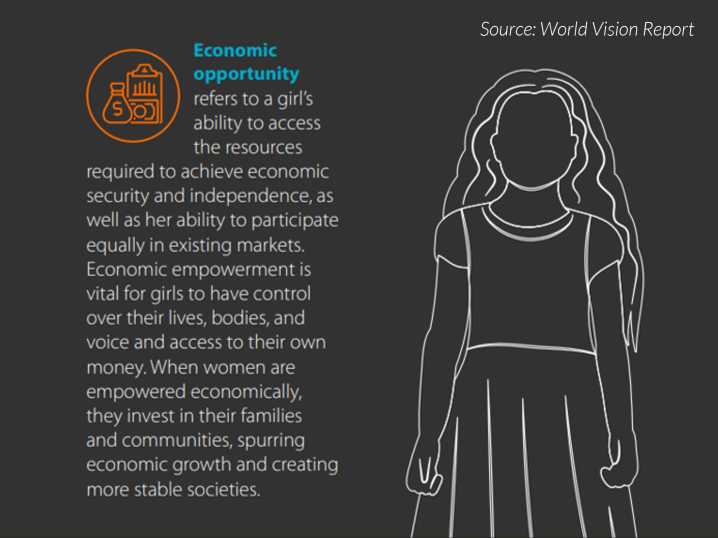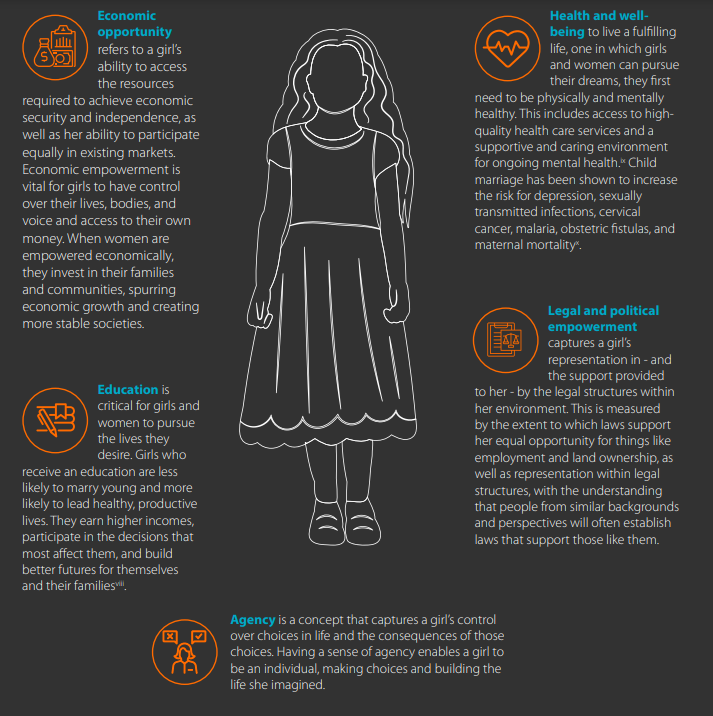INVESTING IN HER FUTURE

On International Day of the Girl Child, Kaitlin McGarvey, North America Fundraising Manager of VisionFund International reflects on the impact of access to economic opportunities.
West Pokot, a region in Kenya bordering Uganda, is referred to as the “land of hidden treasures.” I travelled to West Pokot with colleagues from VisionFund and World Vision’s WASH and Livelihood teams this past June to lay the groundwork for a multi-sectoral program focused on the empowerment of women and girls.
West Pokot is truly a land of treasure. Of course, the landscapes are breathtaking – both the mountains rich with vegetation and the vast expanses of lowlands made arid by climate change – but the true treasure lies in the dreams and potential of the girls we met. The girls who, if equipped with the right resources, have the capacity to build thriving communities.
Current Scenario
The communities we visited in West Pokot are hours from the nearest paved road and market. They are largely nomadic, pastoralist, communities where men and boys are primarily responsible for cattle and goat herding while women and girls are primarily responsible for fetching water.
The women and girls we met walk hours (in one community they walk 4 hours each way) to get water. We were in West Pokot during the wet season, and still the river bed was completely dry. Women had to dig to find groundwater.

Fetching water is filled with risk. Women and girls shared stories of sexual assault, animal attacks, and giving birth on their way to get water. The conversations we had with them highlighted the linkages between the lack of clean water and schooling to early child marriage. These linkages are complex, but not a surprise when communities are struggling with poverty.
Women told us that if they get access to water it would mean their girls would have time to be girls. They could go to school before getting married, and the women could start businesses to support their girls in school. Women shared their business ideas: aloe vera production, agriculture, bakeries, and sewing shops.
One woman shared, “If we have water, our eyes will be open for new dreams – for businesses we can open and possibilities.” Another woman shared, “the men here have not comprehended [the value of] school, so it is the responsibility of the mother to struggle to get their children a pen or pencil.” The women saw a clear linkage between getting water, participating in income-generating activities, paying for their girls to go to school, and more opportunities for their girls’ futures.
The girls we met shared their dreams: finishing school, becoming nurses, doctors, teachers, farmers. One girl dreamed of being a pilot and traveling the world.
A Holistic Response
Many microfinance institutions (MFIs) could not operate in the rural communities of West Pokot because 1) they don’t have the loan products to serve clients at the bottom of the economic ladder and 2) because the women and girls in West Pokot need a holistic response to the challenges they are facing. They need access to education, water, healthcare, and financial services because each plays a role in empowerment and well-being.
VisionFund, as World Vision’s microfinance subsidiary, works in tandem with World Vision’s WASH, education, and health teams to ensure our clients have the best possible opportunities to sustainably break the intergenerational cycle of poverty.
World Vision has recently published ‘Fighting for a Future’, a report that tracks girls’ opportunities in 40 low – and middle – income countries, including the 20 with the highest rates of child marriage.
World Vision defines opportunity as, “having options and support to build a life of choices, meaning, and inclusion, where basic rights are honoured.” Research has shown that social and economic opportunities, such as good schools, stable jobs, and strong social networks are foundational to achieving long and healthy lives. World Vision has determined that these five domains (economic opportunity, education, agency, legal and political empowerment, and health and well-being) are interrelated and work together to create opportunity.
This multi-faceted approach to girls’ empowerment, ensures VisionFund’s work to equip households with financial services is strengthened and reinforced through multiple sectors of programming.

Source: World Vision report 'Fighting for a Future'
Treasured Dreams
We know from recent third-party studies that VisionFund’s work improves the well-being of entire households. We are excited to extend our work to West Pokot. As one woman shared, “It’s not like we aren’t able to do anything. We can do anything. We are just missing capital.” VisionFund is eager to support the women entrepreneurs of West Pokot as they build businesses to support the dreams of their children.
I look forward to the day the dreams of girls in West Pokot are no longer hidden treasures, but are bold, articulated, realities. Extracted from the report 'Fighting for a Future'